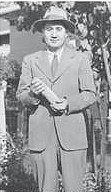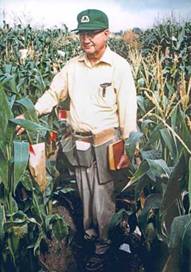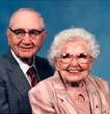RAYMOND F. BAKER

Raymond BAKER not only made a tremendous contribution to Pioneer, he made a tremendous contribution to agriculture,
not only to U. S. agriculture, but to world agriculture. The fact that he mentored all these breeders - and corn yields went
from the 20's for about an average of about 30 bushels an acres, they're now on the average in the U. S. about 140 bushels.
When he retired probably 25% of corn planted in the U. S. had been developed under his direction." -- Owen NEWLIN, Senior Vice-
President, Pioneer Hi-Bred, retired.
Raymond F. BAKER was born near Beaconsfield, Ringgold County, Iowa, in 1906. He grew up on the family farm during a time when
farming was extremely labor-intensive -- when the day began before dawn and the farm family's economic livelihood was precarious,
relying heavily on good weather and a good team for a successful productive year. Corn was hand planted and hand picked with the
farmer reserving the best looking ears of corn to be utilized as seed for the next planting season. During a good year, a farmer
could expect to harvest an average of about 30 bushels of corn per acre. Raymond graduated high school and pursued his continued
education in agronomy at Iowa State College, now Iowa State University, at Ames, Iowa beginning in 1924. In 1926, Raymond attended a Corn Day Program
held at the Armory Building. There, Raymond met Henry WALLACE who had began experimenting with breeding high-yielding corn. Upon
expressing his interest in growing hybrid corn, WALLACE gave Raymond several samples of different lines of seed, instructed him in
the processes involved for breeding hybrid corn, and urged him to run a small experimental program. From this gift, a BAKER and WALLACE
hybrid won the Banner Trophy in the 1928 Iowa Corn Yield Test, producing an astounding yield of 90 bushels per acres. Later that spring,
Henry WALLACE asked Raymond to become the second employee of his newly established Hi-Bred Corn Company, later called the Pioneer Hi-Bred.
Raymond felt this was a unique opportunity that he could not pass up. Later, Raymond reflected, "I was due to graduate in June, but
I skipped that last quarter, because I wanted to get into the seed corn business while it was new." Raymond accepted WALLACE's
offer, making Johnston, Iowa near Pioneer's headquarters his home for the remainder of his life. WALLACE taught him the techniques
and procedures of corn breeding. In 1933, Henry WALLACE was named the U.S. Secretary of Agriculture. Raymond was then promoted to direct
Pioneer's research program. Selling hybrid corn seed to farmers was a difficult task. This changed in the mid-1930's when the Corn
Belt was brought to its knees by a severe drought. Some farmers in the harder hit areas had virtually no crop for three years. Raymond
BAKER's development of drought-tolerant hybrid corn varieties won favor among the farmers and demand for the seed grew drastically.
The research budget at Pioneer grew along with the demand, from $2,000 in 1932 to $53,484,000 in 1988, the year Raymond BAKER
stepped down from the Board of Directors. Raymond's commitment to scientific rigor and his leadership abilities have been attributed
to Pioneer's research success. Arnel HALLAUER, Agronomy Distinguished Professor Emeritus at Iowa State University wrote, "His
personal deveopment of outstanding hybrids and his ability to assemble and direct a high-quality pland breeding staff formed the base
for rapid expansion of Pioneer Hi-Bred, International." Raymond said, "I know of no substitute for the careful detailed work of
planting and harvesting these hybrids under all types of soil and weather conditions. Here more than any place else, systematic detailed
work by careful technicians is most important." During his fifty-plus years of breeding corn, Raymond initiated the practices of
comparison test plots, cold germination test, and breeding for insect and disease resistance, all now standard procedures in corn breeding
and hybrid seed production. He was a pioneer who possessed foresight. Raymond was the father of two sons, Lee who was
born in 1930, and Laurence "Larry" who was born in 1933. After serving in the United States Marine Corps, Lee farmed the BAKER
homestead farm with his grandfather, the same land where Raymond planted his first hybrid seeds. Larry obtained his Ph.D in
statistics at the University of Minnesota. He established an extremely successful career in computer systems. He tragically died
at the age of 49. The Laurence H. BAKER Center for Bioinformatics and Biological Statistics was established in his memory at Iowa State
University. Raymond's sons assisted their father in his hobby, developing the perfect watermelon. He grew inbred lines of melons and from
them developed excellent watermelon hybrids. Lee and Larry spent many a weekend conducting taste and quality testing as their father
developed his watermelon hybrids. Many of Raymond's colleagues were the recipients of packets of his best watermelon seeds.
 "Whenever there was corn, he'd be out tromping around and keeping an eye on it. There had to be an awfully good reason for him to
skip a day in the cornfield."
"Whenever there was corn, he'd be out tromping around and keeping an eye on it. There had to be an awfully good reason for him to
skip a day in the cornfield."
-- Joe BAKER, grandson of Raymond BAKER. Mary Morrison COLLIER was born in Fremont, Iowa in 1904. A gifted
student, she earned a degree in mathematics and science in 1927 at Des Moines University. Upon obtaining her degree, Mary taught high school
business classes at Spirit Lake and Greenfield. Mary also worked part-time for Bankers Life Insurance Company in the actuarial
department. Although she was interested in pursuing a career in actuarial science, she was strongly discouraged due to the fact that she
was a woman. Here the seeds were sown and developed into Mary's life-long interest in expanding opportunities for women. Later during her
career, Mary worked for the Department of Agriculture in Des Moines and in Washington, D.C. Mary and Raymond met and were married in 1967.
The newly-weds honeymooned in Hawaii, spending part of their time touring the islands and the rest of the time looking for possible sites
conductive for growing corn.
 Mary and Raymond were active members of their church. Mary was active in the American Association of University Woman, serving as president for
the Des Moines University Alumni Association.
Mary and Raymond were active members of their church. Mary was active in the American Association of University Woman, serving as president for
the Des Moines University Alumni Association. Raymond committed his life in advancing the profession of plant breeding for furture generations.
He was a Fellow in both the American Association for the Advancement of Science and the American Society of Agronomy, playing an instrumental
role in establishing the National Council of Commercial Plant Breeders. Through funding from Pioneer Hi-Bred, Raymond initiated in 1946 a research
assistantship for Iowa State University students who were studying corn breeding. The Raymond F. BAKER Center for Plant Breeding was named in his honor and
established to promote the art and science of plant breeding with in ISU's Plant Sciences Institute. Raymond and Mary were generous benefactors of the
Lion's Club of Iowa, Variety Clubs International, and various initiatives at Iowa State University. Raymond received an Honorary Doctorate of Humane Letters,
the first such degree awarded at Iowa State University in 26 years. He retired as Pioneer's corporate vice-president and head of the corn research department,
but continued to work as a corn breeder. He was awarded the Alumni Medal from the Iowa State University Alumni Association, named the National Chairman of the Iowa
State University Achievement Fund, was a member of the Iowa State University Foundation Board of Governors, and was on the Pioneer Hi-Bred International Board of Directors.
Raymond BAKER died in 1999 at the age of ninety-two. Throughout his life, Raymond recognized the advantages that improved crops could bring to the citizens of Iowa and to the
world. He devoted his life to the advancement of his profession for the benefit of science, his state, and the larger community.
SOURCES: MINEAR, Marcia. "Raymond Baker: A Pioneering Plant Breeder." Iowa State University, 2007.
Transcription & submission by Sharon R. Becker, 2008
BIOGRAPHICAL SKETCHES INDEX
| 


